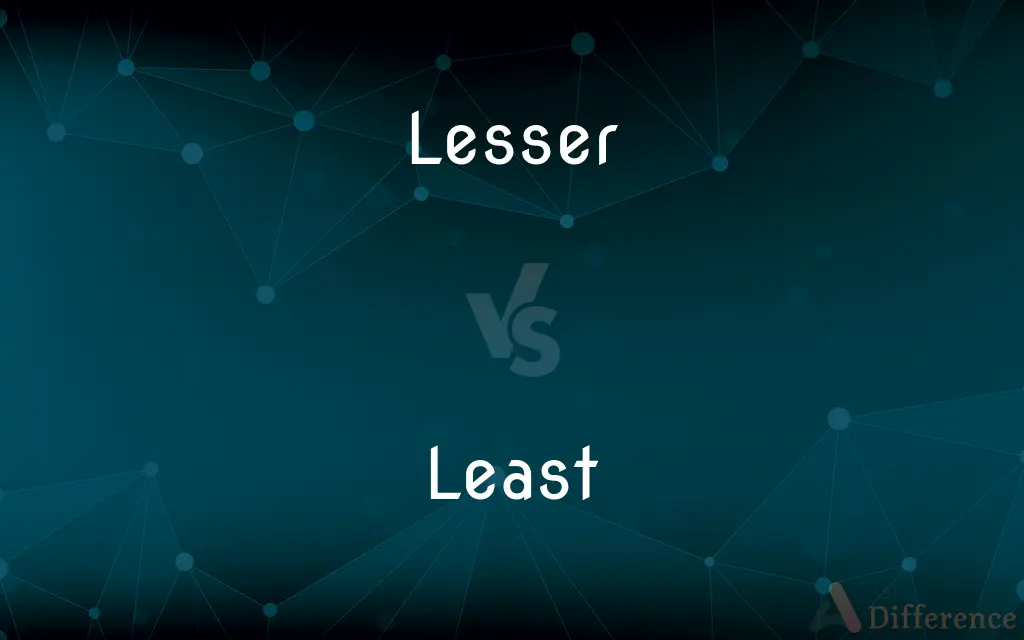Lesser vs. Least — What's the Difference?
By Maham Liaqat & Fiza Rafique — Updated on March 20, 2024
Lesser is comparative, implying something is smaller in amount or importance than another, while least is superlative, indicating the smallest or lowest degree among three or more.

Difference Between Lesser and Least
Table of Contents
ADVERTISEMENT
Key Differences
Lesser is used when comparing two things, suggesting that one is smaller in size, amount, importance, or quality than the other. It's the comparative form of 'little' and 'less' and is often used to indicate a lower degree or rank among two entities. On the other hand, least is the superlative form of 'little' and 'less' and is used to describe the lowest degree or amount among three or more items or entities. It points to the one that is the smallest, least significant, or lowest in rank.
Lesser also implies a reduction in quality or desirability compared to something else, often used in contexts where two options or items are being weighed against each other. Whereas least is used to signify the minimum extent, quantity, or degree of something, often in a broader context involving more than two options.
In usage, lesser is frequently part of fixed phrases or idiomatic expressions, such as "the lesser of two evils," which suggests choosing the option that is considered less harmful or undesirable among two bad choices. Least, however, is commonly used in expressions like "last but not least," indicating that the final item in a list, despite being mentioned last, is not of the lowest importance or quality.
Both terms can be used in various contexts, including quantity, quality, and degree, but their usage depends on the number of items being compared and the relative comparison being made. While "lesser" is appropriate for direct comparisons between two entities, "least" is suitable for indicating the extreme end of a scale or range among multiple items.
Comparison Chart
Form
Comparative
Superlative
ADVERTISEMENT
Comparison
Between two entities
Among three or more entities
Implication
Smaller, less important, or lower degree than another
Smallest, least important, or lowest degree among all
Usage
Often in direct comparisons and binary choices
Used to highlight the minimum in a group or series
Example Use
"In this scenario, the lesser problem is staffing."
"Of all the issues, budget constraints are the least of our worries."
Compare with Definitions
Lesser
Lesser indicates a comparative degree between two things, suggesting one is not as great as the other.
In a debate on priorities, one might argue that funding for the arts is a lesser concern compared to healthcare.
Least
Appears in various contexts, from quantitative assessments to qualitative judgments.
In evaluating solutions, the one with the least complexity might be favored for implementation.
Lesser
Commonly found in expressions and idioms, highlighting its role in comparative judgments.
In risk management, strategies often aim to mitigate the lesser of two potential threats.
Least
Least is the superlative, indicating the lowest degree or amount in a group.
In a discussion about city problems, one might say pollution is the least of our concerns.
Lesser
It often reflects a reduction in quality, significance, or desirability.
In historical contexts, a younger sibling in a royal family might be referred to as the lesser prince.
Least
It denotes the minimum extent, degree, or quantity of something.
In budget allocations, the least amount might be designated for the least pressing project.
Lesser
Typically used in scenarios involving a choice or comparison between two entities.
When choosing between two unappealing options, one might seek the lesser evil.
Least
Used when comparing three or more items, identifying the one at the bottom of the scale.
Among many strategies, the least effective is often abandoned.
Lesser
The term is relative, dependent on the context and the two items being compared.
Among two candidates for a job, one might be considered the lesser fit based on qualifications.
Least
Least is absolute, not relative, defining the bottom end of a range without direct comparison.
Of all the seasons, winter has the least daylight.
Lesser
Lesser, from Eliezer (Hebrew: אֱלִיעֶזֶר, Modern: Eli'ezer, Tiberian: ʼĔlîʻézer, "Help/Court of my God"), is a surname. Notable people with the surname include: Adolf Lesser (1851–1926), German physician Aleksander Lesser (1814–1884), Polish painter and art critic Anton Lesser (born 1952), British actor Axel Lesser (born 1946), East German cross country skier Edmund Lesser (1852–1918), German dermatologist Erik Lesser (born 1988), German biathlete Gabriele Lesser (born 1960), German historian and journalist George Lesser, American musician Gerald S. Lesser (1926–2010), American psychologist Henry Lesser (born 1963), German footballer J Lesser (born 1970), American musician Len Lesser (1922–2011), American actor Louis Lesser (born 1916), American real estate developer Matt Lesser, Connecticut politician Mike Lesser (born 1943), British mathematical philosopher and political activist Milton Lesser or Stephen Marlowe (1928–2008), American author Norman Lesser (1902–1985), Anglican bishop and Archbishop of New Zealand Otto Lesser (1830–1887), German astronomer Rika Lesser (born 1953), American poet Robert Lesser (born 1942), American actor Rosa Lesser, Austrian luger Ryan Lesser, Rhode Island video game designer Sam Lesser or Sam Russell (1915–2010), British journalist and Spanish Civil War veteran Sol Lesser (1890–1980), American film producer Stephen A. Lesser (born 1944), American architect Virginia Lesser, American statistician Wendy Lesser (born 1952), American author, editor and critic Werner Lesser (1932–2005), East German ski jumperLesser is also a given name.
Least
Lowest in importance or rank.
Lesser
Smaller in amount, value, or importance, especially in a comparison between two things
Chose the lesser evil.
Least
Smallest in magnitude or degree.
Lesser
Of a smaller size than other, similar forms
The lesser anteater.
Least
Slightest or tiniest
Didn't care the least bit.
Lesser
Less. Used before a participle
A lesser-known writer.
Least
To or in the lowest or smallest degree.
Lesser
One that is lower in importance, rank, magnitude, or degree
The lesser of two evils.
Least
One that is the lowest or smallest in importance, rank, magnitude, or degree
The dinner menu is the least of my worries tonight. The least you can do is to be polite.
Lesser
Of two (or, rarely, more than two) things: the smaller in size (littler), in value, in importance etc.
Lesser panda, lesser yellowlegs''
Least
The most little; the smallest amount or quantity of something.
He earns the least money in his family.
Of all the sisters, she has the least patience.
Can only afford to pay the least of the bills.
I'm giving (the) least of all towards her present.
Lesser
A thing that is of smaller size, value, importance etc.
The lesser of two evils
The greater sand hills increasingly do not migrate, but almost all lessers do.
Least
Used for forming superlatives of adjectives, especially those that do not form the superlative by adding -est.
It was the least surprising thing.
Lesser
Less; smaller; inferior.
God made . . . the lesser light to rule the night.
The more my prayer, the lesser is my grace.
The larger here, and there the lesser lambs.
By the same reason may a man, in the state of nature, punish the lesser breaches of the law.
Least
In the smallest or lowest degree; in a degree below all others.
To reward those who least deserve it
I never hid the truth, least of all from you.
I don't much like housework, and I like cooking least.
Lesser
Less.
Least
(philosophy) Something of the smallest possible extent; an indivisible unit.
Lesser
Of less size or importance;
The lesser anteater
The lesser of two evils
Least
Superlative of little; smallest
Least weasel
Least common multiple
Lesser
Smaller in size or amount or value;
The lesser powers of Europe
The lesser anteater
Least
Smallest, either in size or degree; shortest; lowest; most unimportant; as, the least insect; the least mercy; the least space.
I am the least of the apostles.
He who tempts, though in vain, at least aspersesThe tempted with dishonor.
Upon the mast they saw a young man, at least if he were a man, who sat as on horseback.
Least
In the smallest or lowest degree; in a degree below all others; as, to reward those who least deserve it.
Least
The superlative of `little' that can be used with mass nouns and is usually preceded by `the'; a quantifier meaning smallest in amount or extent or degree;
Didn't care the least bit
He has the least talent of anyone
Least
Minimal in magnitude;
Lowest wages
The least amount of fat allowed
The smallest amount
Least
Having or being distinguished by diminutive size;
The least bittern
Least
Used to form the superlative;
The garter snake is the least dangerous snake
Common Curiosities
Can 'lesser' and 'least' be used interchangeably?
No, because 'lesser' is used for comparisons between two items, while 'least' is used for comparisons among three or more.
What does 'lesser' mean?
Lesser is a comparative term indicating that something is smaller, less significant, or lower in degree compared to another.
How can 'least' be used in a sentence?
"Among all the challenges we face, finding volunteers is the least difficult."
How is 'least' used?
Least is used as a superlative to denote the smallest amount, lowest degree, or least significance among three or more entities.
What is an example of 'lesser' in a sentence?
"In comparing the two routes, the southern path is the lesser traveled."
Is it correct to say 'the least of two evils'?
No, the correct expression is "the lesser of two evils," since it involves a comparison between two unfavorable options.
Is 'lesser' always negative?
Not necessarily; 'lesser' simply implies a lower degree or amount. It can be neutral depending on the context.
Does 'least' imply a negative connotation?
'Least' just indicates the minimum or lowest degree and does not inherently carry a negative connotation. Context determines its positivity or negativity.
What is the superlative form of 'less'?
The superlative form of 'less' is 'least', used to denote the lowest degree or amount among three or more items.
What is the comparative form of 'little'?
The comparative form of 'little' is 'lesser', used to compare two items or entities in terms of size, amount, or importance.
Can 'lesser' refer to quality instead of quantity?
Yes, 'lesser' can refer to a reduction in quality, significance, or desirability when comparing two items.
How can 'least' be used in a positive context?
'Least' can be used positively when it highlights a minimal concern among larger issues, indicating that something is not a significant problem.
What is an example of 'lesser' being used in a positive way?
A positive use of 'lesser' might be in the phrase "lesser-known gems," referring to things that are not widely recognized but are valuable or enjoyable.
In what context would 'lesser' be the appropriate choice?
'Lesser' is appropriate in contexts where a direct comparison between two things is made, indicating that one is not as great or significant as the other.
When should I use 'least' instead of 'lesser'?
Use 'least' when discussing three or more items, to point out the one that is the smallest, least significant, or lowest in rank or degree.
Does 'least' always refer to negative aspects?
No, 'least' simply indicates the minimum or lowest level and can refer to both negative and positive aspects depending on the context.
Share Your Discovery

Previous Comparison
Luck vs. Windfall
Next Comparison
Sad vs. EmoAuthor Spotlight
Written by
Maham LiaqatCo-written by
Fiza RafiqueFiza Rafique is a skilled content writer at AskDifference.com, where she meticulously refines and enhances written pieces. Drawing from her vast editorial expertise, Fiza ensures clarity, accuracy, and precision in every article. Passionate about language, she continually seeks to elevate the quality of content for readers worldwide.














































